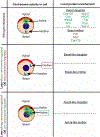Understanding microcephaly through the study of centrosome regulation in Drosophila neural stem cells
- PMID: 32897294
- PMCID: PMC7606523
- DOI: 10.1042/BST20200261
Understanding microcephaly through the study of centrosome regulation in Drosophila neural stem cells
Abstract
Microcephaly is a rare, yet devastating, neurodevelopmental condition caused by genetic or environmental insults, such as the Zika virus infection. Microcephaly manifests with a severely reduced head circumference. Among the known heritable microcephaly genes, a significant proportion are annotated with centrosome-related ontologies. Centrosomes are microtubule-organizing centers, and they play fundamental roles in the proliferation of the neuronal progenitors, the neural stem cells (NSCs), which undergo repeated rounds of asymmetric cell division to drive neurogenesis and brain development. Many of the genes, pathways, and developmental paradigms that dictate NSC development in humans are conserved in Drosophila melanogaster. As such, studies of Drosophila NSCs lend invaluable insights into centrosome function within NSCs and help inform the pathophysiology of human microcephaly. This mini-review will briefly survey causative links between deregulated centrosome functions and microcephaly with particular emphasis on insights learned from Drosophila NSCs.
Keywords: Drosophila melanogaster; centrosomes; intellectual disability; microcephaly; neural stem cells.
© 2020 The Author(s). Published by Portland Press Limited on behalf of the Biochemical Society.
Figures



References
Publication types
MeSH terms
Grants and funding
LinkOut - more resources
Full Text Sources
Molecular Biology Databases
Research Materials

